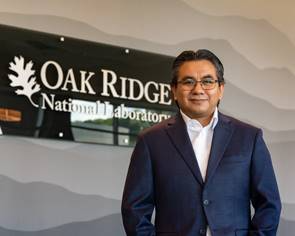
An early career engineer who wants to network with leaders. A plasma physicist who wants to improve inclusivity at ORNL. An ITER staff member who wants to support STEM outreach to students. These are a few examples of staff in our directorate who have benefitted from joining an Employee Resource Group here at the lab. As you read of some of their experiences below, I encourage you to consider participating. As many of you know, I am a member and the executive champion of ORNL’s HOLA (Hispanic and Latino Organization for Leadership and Awareness) group. As you read this issue, remember to share any ideas you have for future content with Connections writer Amy Reed (reedac@ornl.gov).
—Kathy McCarthy, Associate Laboratory Director, April 2022

HOLA ORNL (Hispanic and Latino Organization for Leadership and Awareness at ORNL)
From engaging local Hispanic first graders in science to creating a sense of community for Hispanic staff at ORNL, members emphasize the multiple layers of benefits that HOLA ORNL brings to the lab.
“HOLA creates a sense of community by bringing together staff who share similar values, traditions, food, and language,” said plasma physicist Diego del-Castillo-Negrete, a distinguished scientist in the Fusion Energy Division. “This benefits not only current staff but also recruiting efforts. Being able to mention the existence of HOLA during job interviews makes the lab more attractive as an employer.”
Outreach to minority communities is critical to the lab’s success and longevity, said Eddie López Honorato, a scientist in the Nuclear Energy Fuel Cycle Division.
“We need diversity of ideas among our staff if we are to solve the complex scientific challenges that we’re tackling,” Honorato said. “To improve the lab’s diversity with that goal in mind, HOLA is working with other ERGs to implement and propose a series of actions to the lab that would increase outreach to Hispanic and other minority communities.”
One area HOLA already has improved is expanding inclusion of Hispanic students and post-doctoral researchers for internships and fellowships at ORNL. The group also is about to start science and math-based activities for elementary school students.
“In fall this year we will start working with two Hispanic communities, one in Oak Ridge and one in downtown Knoxville, to show children the beauty of science through Lego activities,” Honorato said. “The goal is to nurture the next generation of young scientists and engineers.”
HOLA’s role in improving inclusion and diversity at the lab is a two-way street, said del-Castillo-Negrete. “The lab is invisible to some Hispanic communities as a scientific institution helping humankind solve challenges such as clean energy. Those communities, in turn, are currently invisible to the lab. HOLA is trying to change that on both sides.”
Future Leaders Network
Monthly activities of the Future Leaders Network provide an outlet for connecting with like-minded staff who want to hone their leadership skills as well as meeting current leaders at the lab, said Justin Weinmeister, a mechanical engineer in the Nuclear Energy Fuel Cycle Division.
“The network hosts social activities and leadership seminars that have allowed me to connect with folks from across the lab who have an interest in leadership,” Weinmeister said. “Our focus is on honing scientific, technical leadership in our fields, as opposed to supervisory skills.”
One benefit for Weinmeister has been strengthening a bond with a mentor who helped him expand in an area of technical expertise. “Franklin Curtis, who is on the advisory board for the network, has helped me develop my expertise in computational fluid mechanics. He has connected me to others at the lab running projects where I can assist and has given me insight to the lab’s areas of need in nuclear R&D.”
WINGS (Women in Nuclear and Global Security)
Founded to create a welcoming social network and provide support, Women in Nuclear and Global Security (WINGS) has participants across FFESD who have found it rewarding to participate.
WINGS hosts social events and seminars, works with lab management to promote new workplace policies, and supports STEM (science, technology, engineering, and math) outreach.
“As a woman in a STEM field, outreach to students is important to me, and WINGS provides opportunities for that,” said Amelia Campbell, a project engineer with US ITER. “I like to show up in a classroom or an event and let students see that women are represented in engineering work – to let them see that anyone can be an engineer.”
WINGS has participated in panels for college students, spoken to middle school groups, and held events such as Stump the Scientist for elementary students.
“Another benefit for me personally has been WINGS gatherings where I can form new friendships with other women,” Campbell said. “I’ve made several new friends, and monthly WINGS events help keep those bonds growing.”

